The Order
A film based on a true story of the enduring problem with America.
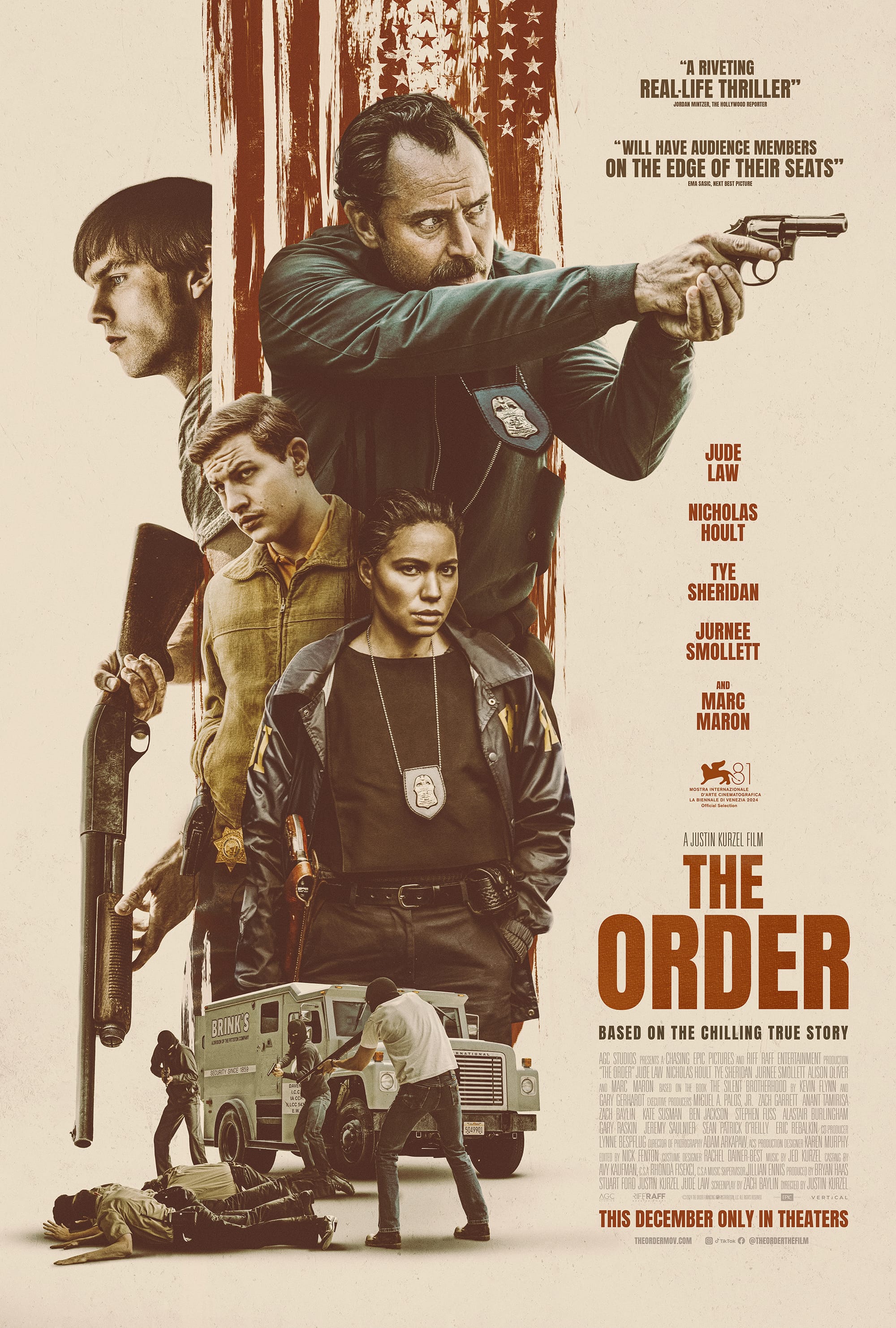
A string of violent robberies in the Pacific Northwest leads veteran FBI agent Terry Husk to a white supremacist group with plans to overthrow the government.
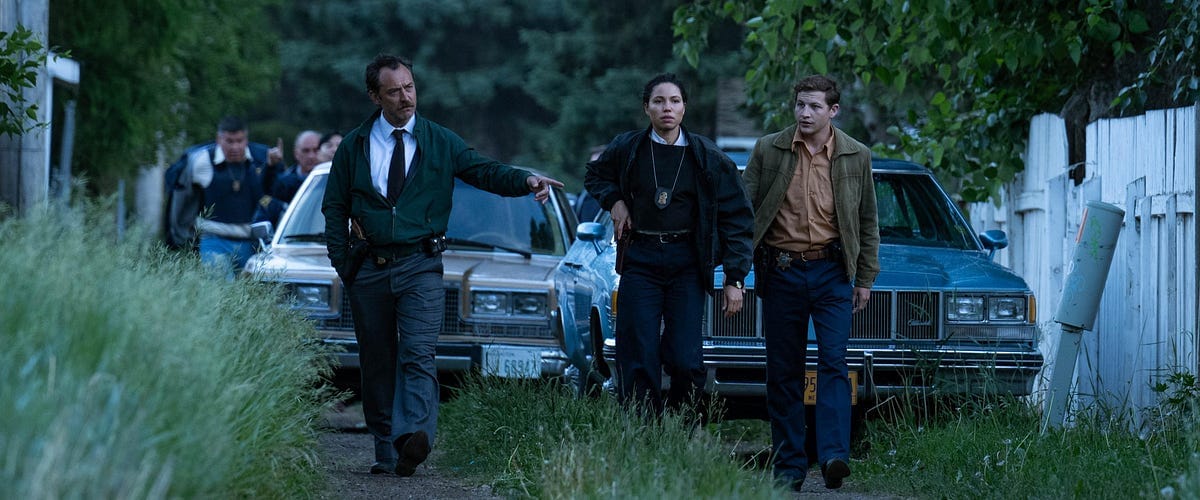
A dramatization of a true story, The Order recounts the events that led up to the 1984 murder of Alan Berg, a Jewish radio personality known for his outspoken and confrontational liberal views, by white supremacists. The film opens with an excerpt from one of his late night broadcasts…
“You know what my problem is with every fanatic fundamentalist? From the Catholics, to the Orthodox, to the KKK? The one thing you all have in common is, and you’re too ignorant to see it, is that you’re too inept to get by in the world, so your only recourse is to try and curtail the enjoyment of others.”
For being so willing to speak loudly in the public square about the truth of who white America truly is, about the reality of white culture, Alan Berg was murdered. For being willing to directly confront white supremacists on his radio show, both the ones who froth and scream their hatreds in public and the ones who wear the more polite and civil mask, Alan Berg was shot down in his driveway by assassins firing from the darkness like the loathsome cowards they are.
The Order is the story of the people who were responsible for this murder.
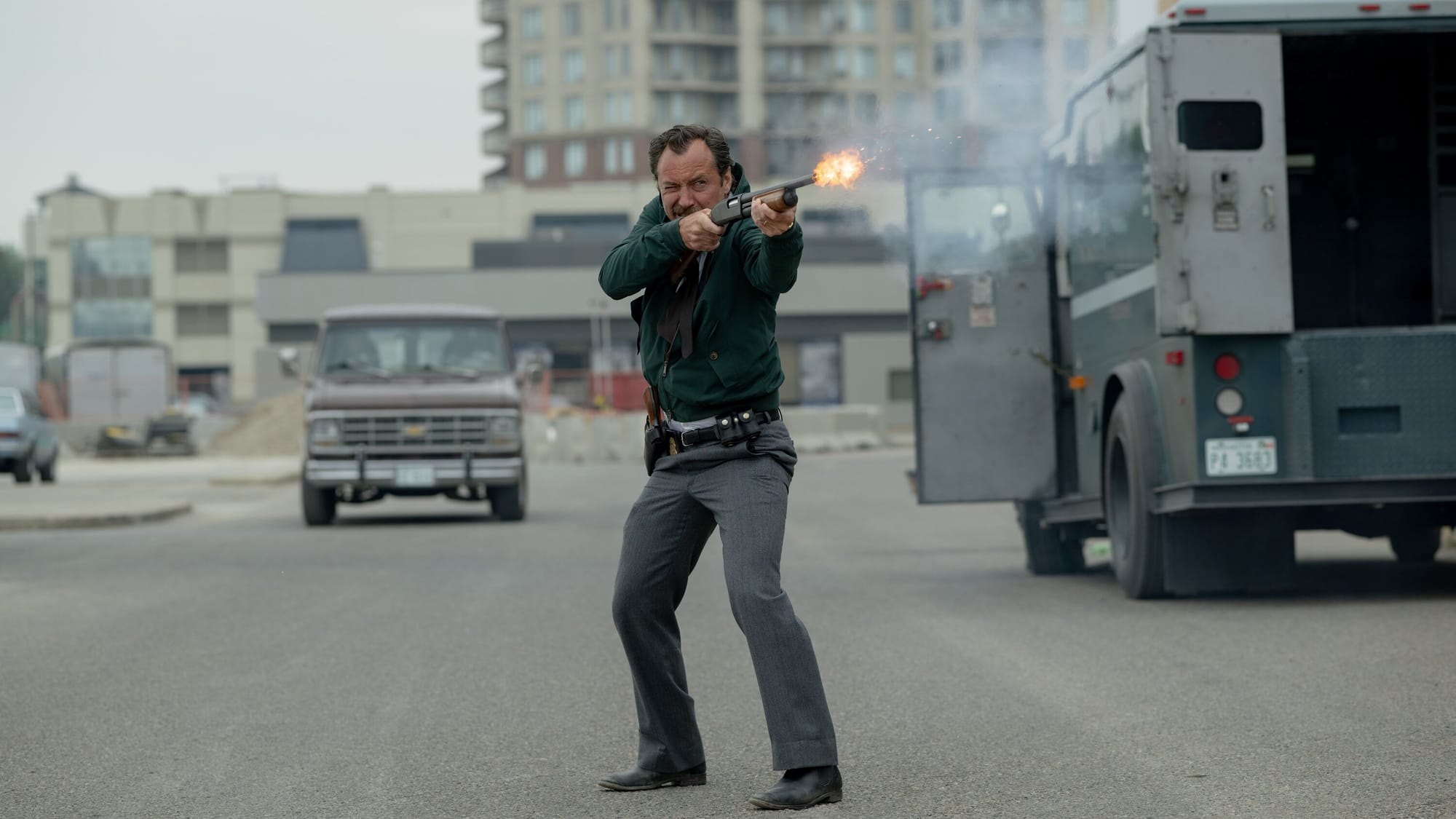
Beginning in 1983, the film opens with a pair of typical dirt-chute rural white Supremacists named Bruce Pierce and Gary Yarbrough, as they lure a third loser white Supremacist, Walter West, into the woods under the ruse of a hunting trip, where they murder him.
These men are all a part of an extremist direct-action splinter group called The Order, led by a man named Bob Mathews. Disavowed by the local Aryan Nation, which prefers to use the pulpit in order to get rabid white Supremacists voted into political office, The Order intends to build an army of white Supremacists, ignite a race war through acts of domestic terrorism, and ultimately overthrow the U.S. government. Pierce and Yarbough were sent by Mathews to murder West, because Mathews was worried that West was a potential security risk, one that threatened The Order’s money-raising and recruiting efforts, which involved bank robberies, counterfeiting, and a series of synagogue and porno theatre bombings.
Around this time, in an effort to have a generally less stressful caseload, after working intense investigations into both the Ku Klux Klan and La Cosa Nostra, veteran FBI agent Terry Husk takes over the long-vacant FBI field office in Coeur d'Alene. His work has been disruptive to his family life, and he hopes the change in scenery, and the slower pace, will be enough to persuade his estranged wife and daughter to move out to Idaho with him.
But when Bob Mathers, Bruce Pierce, Gary Yarbrough, and a fourth scumbag asshole white supremacist named David Lane, rob the Washington Mutual branch bank in Spokane, Washington, Agent Husk suddenly finds himself in the middle of a very stressful and very dangerous new case. Not only does this new case connect to several more robberies and bombings, not mention counterfeit cash, but soon enough, he discovers Walter West’s body in a shallow grave. All this leads to Agent Husk realizing that The Order is using a shitty 1978 sci-if novel called The Turner Diaries as a blueprint to ignite a race war and a white supremacist revolution.
This all culminates in the murder of Alan Berg, an act which ultimately destroys The Order itself, if not the general threat of white supremacy in America…
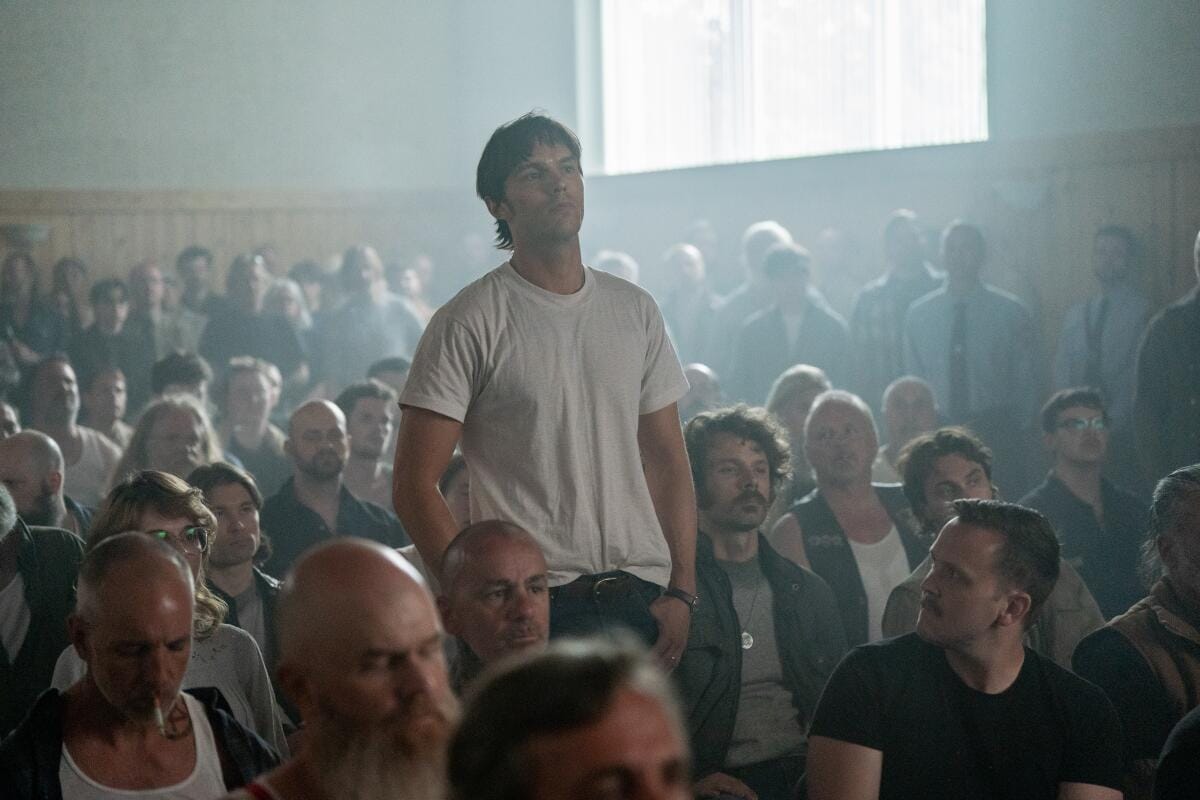
A nice little ”true crime” drama, one that has a very “True Detective” kind of feel, with it's well-done 1980s setting, The Order is a gritty, violent, and good looking, but pretty typical cops and robbers thriller. Jude Law and Nicholas Hoult turn in great performances. Seemingly playing modern day versions of the relentless and grizzled Wild West sheriff, and the cocky and aggressive local outlaw, they're a pair of big dogs circling each other in the yard, both destined to live and die by the gun. It's fun watching them play off each other, and the rest of the cast. They're what makes this good, but otherwise pretty paint-by-numbers thriller worth watching, honestly. That having said, despite being an entertaining little film, The Order also feels too quaint and out of step.
The Order is set in a somewhat delusionally nostalgic version of past America, where white supremacy seemingly only exists on the forgotten rural fringes, and is only truly embraced by smelly, uneducated dipshits in the middle-of-nowhere. And while this may or may not have been accurate for this specific time and place and story, it ends up feeling like it's avoiding acknowledging the world we live in now.
Yes, The Order is based on real life events that happened in the Pacific Northwest from 40-odd years ago, but that aside, accurate or not, the entire presentation of the world of the film feels like it was informed by an out-dated conception of who bigot white America really is. It's the usual bigot-hick tropes, which now seem like they were created by white-American-controlled pop culture specifically as a shield for the racism found amongst white people who are educated and have money and own businesses, and generally aren't sitting on a lopsided front porch in a pair of old cover-alls and a straw hat playing the jug in a hill-billy band. The film feels like cosplay, like they put more effort into getting period accurate cars then they did in talking about who these people are, where they come from, and where exactly they are going. Instead of reflecting on how the events of this film are actually the roots of the reality we live in now, where the ideas and agendas of white supremacy have been revealed to actually be much more commonplace, widespread, centralized, respectable, and malignant than the polite society of White America would like you to understand, we get the usual bag of "evil hick" tricks, like a not so family friendly version of the Dukes of Hazard.
And maybe this film is a 100% accurate portrayal of the people and places at the time when the story took place, I don't know, but in a broader context, it still feels like an excuse. It feels like the problem of the bad guys' motivations is being held at arm's length, "that's them, out there, not us, we don't think that way." Like it's being held up to shock, so that the very people who are responsible for redlining, for white flight, for underfunding certain areas, for ignoring the needs of certain populations, and instead, militarizing the police, then turning a blind eye to the results because they get to have a nice brunch in a safe area, can feel better about themselves, like "I'm not racist, I vote Democrat." It feels like "Can you believe that people once thought like this" is the intent, like the film believes that racism and white supremacy is a thing of the past, instead of examining how there is a direct line running from these events to our current reality, which is...
These people are now running the government.
And even worse, that those people were put there by white American voters, by people who either directly support them, or excuse and enable those who do. Now, I’m sure there are folks out there who will immediately rush to say, “Come on now, Jon, it’s not all white people, it’s just one small group.” To which I would respond, “Right, of course, it’s not all white Americans, it's just the overwhelming majority across all demographics, nearly 60%, at least according to every poll ever, so yeah, sure, it’s not all white people… just most of them, just that one small group.”
I get that this is a “true crime” historical movie. I get that. But watching the film, and having it not tie these events into current events, it's not just disappointing, it also feels like the film deliberately has on blinders. It wants the grit and glamour of the true crime, but not the context.
In a way, watching this film reminded me the similar experience of watching Rings of Power, the prequel series which takes place long before the Hobbit and the Lord of the Rings, where the basic story is:
“Well, we thought we killed Sauron…
But we didn’t.
Then, for awhile, people didn’t believe he was even still around, much less a threat, and that really slowed down our efforts to kill him again, but eventually, we were able to, and we really thought we killed him for good…
But we didn’t.
And then he made the rings, and y’know, yeah, sure, that’s on us. That’s our fault. That’s totally our fault, since… y’know… he did make them with our help, in one of our foundries, so yeah… that’s on us. But when we found out, we went after him, and we really thought we killed him, y’know, this time for sure…
But we didn’t.
So then, we all got together and were like, that’s it. We’re done with this guy. And I swear, we really thought that we got him that time. We really did. Isildur even cut The Ring off his hand, like cut his fingers completely off with Narsil, and because of that, he exploded! Saurin exploded! You can’t really blame us for thinking that we’d killed him that time…
But, y’know… yeah, turns out, we didn’t.
Then Isildur lost The Ring, and Gollum had it forever, and no one even knew that. But then Bilbo found it! And you know how that ended. The point is… eventually, we really did kill Sauron.
We’re almost 100% sure of it this time.
That’s what watching this movie is like, but instead of being about Sauron, it’s about White Supremacists, and also, not only did we not stop them at all, they now run the entire country. The inevitability of the coming ruin, and the complete failure to prevent it, it's too much to ignore.
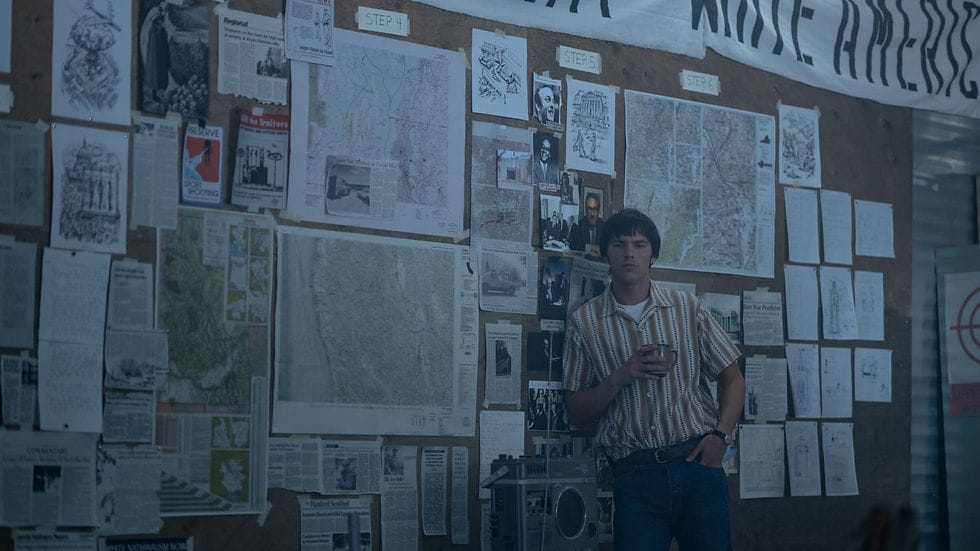
So here we are, this is our world, and this is a film all about its roots, but not about our failure to address those roots. It’s a fun crime thriller, yes, but it feels a little bit like watching milk being spilled. Which is depressing.
Still, yeah, The Order is good. Kind of quiet, kind of low key, but good. Despite my disappointment with the world, I’d still recommend it.
